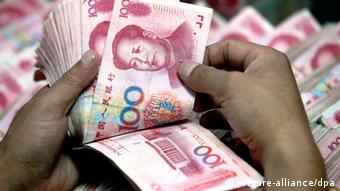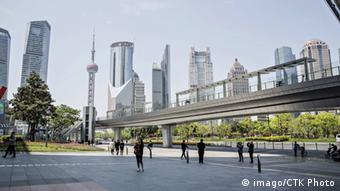Is China's gateway to global financial markets in danger?
Hong Kong has long been one of the world's most important financial centers. But this status could change if China reacts too severely to pro-democracy protests currently disrupting the city.
Hong Kong is right there at the top, economically speaking - worldwide, in fact, if one is to believe the regular conclusion reached by the "Index of Economic Freedom" published by the US think tank Heritage Foundation and the Wall Street Journal. For the 20th time in a row, the report put the former British colony at the global forefront as the location with the most business-friendly climate. The city is still profiting from its special status as a bridgehead for business dealings with China.
It is true that Hong Kong's economic clout has lessened since it was returned to Beijing, and also as a result of the economic boom in the People's Republic: in 1997, the year of the handover, Hong Kong was still contributing 16 percent of the entire Chinese gross domestic product, whereas today it provides a meager three percent. But Hong Kong is still "indispensable" to China's economy as a financial staging post, "The Economist" maintained at the end of September.
The Hong Kong Stock Exchange (HKEx) is the sixth largest stock exchange in the world and the second largest in Asia. The "special administrative region" is also the second-largest private equity center in Asia. More than 70 of the world's 100 biggest banks operate in Hong Kong, and some two thirds of all direct foreign investments in China pass through this nerve center. Even years after mainland stock exchanges were set up in Shanghai and Shenzhen - in which the Hong Kong exchange takes part - Hong Kong is the most important international trading center for shares in Chinese companies. In December 2013, altogether 1643 companies were listed at the Hong Kong exchange, 797 of them from mainland China. They account for some 60 percent of the market capitalization of all listed companies on the HKEx.
Rule of law as locational benefit
International companies appreciate Hong Kong as a hub for carrying out business with China not just because it is a financial center, but because of the secure legal conditions and the independence of the courts in the city. A violent crackdown on the pro-democracy demonstrators currently staging protests in the city center would have extremely damaging consequences, says Sebastian Heilmann, who heads the Berlin-based China think tank MERICS (Mercator Institute for China Studies): "Representatives of Hong Kong's business and finance elite don't want any long-term demonstrations, because they have already paralyzed parts of Hong Kong's economic life. From their perspective, a military operation would have devastating effects on Hong Kong as an international finance and economic center."
The favorable legal conditions provided by the rule of law and the credibility of future administrations would be irreparably harmed by any military action, Heilman emphasizes. Under such a future administrative practice, he says, Hong Kong would become a metropolis of the People's Republic of China that would retain some economic importance but would be "pulled into line" under direct political control - even if it were to continue to be called a "special administrative region."
Trading center for the "people's currency"
Hong Kong still plays a key role in Beijing's long-term strategy of making the renminbi currency, which means "people's currency" in English, one of the main mediums of exchange in the world.Under the plan, renminbi is to become one of the most important trading, investment and reserve currencies in several steps.
Hong Kong is the largest and most important trading center for the mainland's currency. Ninety percent of the foreign trade carried out in renminbi was transacted in Hong Kong. Since July 2010, banks there can process money tranactions between themselves in renminbi, more and more shares at the stock exchange are traded in the "people's currency," and the finance industry is developing a series of financial products that are based on renminbi as well.
Shanghai and Singapore to profit from the crisis?
However, although Hong Kong is very important for China's access to international finance and exchange markets, it no longer has the same exclusive, irreplaceable key position that it had even just ten years ago, the China expert Heilmann says. "If Hong Kong were to be damaged as a financial center amid the current political unrest, it would considerably accelerate Shanghai's rise to become the most important international financial hub in China - not just because the Chinese goverment will try to bring this about, but also because Chinese and international demand will move in the direction of Shanghai."
The financial press has seen much speculation about where international corporations will move their activities if Beijing does choose to pursue the path of escalation. Allegedly, big international banks in Hong Kong already have plans in store to shift part of their business to Singapore. But Sebastian Heilmann is skeptical about their value: "Singapore is already an important offshore financial center for Chinese companies and investors. But Singapore would not have the volume and market distance to be able to take over Hong Kong's business. If Hong Kong were to suffer a political setback, Singapore would profit from it. But the main beneficiary would be Shanghai." The MERICS director is convinced that any weakening of Hong Kong as a financial center would cause a very rapid expansion of Shanghai into a fully-fledged Chinese international financial hub. China's real economy would cope with a violent resolution of the conflict in Hong Kong, Heilmann thinks. "In an economic regard, China could absorb all the probably short-term economic drawbacks associated with a military intervention in Hong Kong," he says.
But the "Economist" sees things differently: " But it would be a grave mistake to conclude that Hong Kong therefore does not matter to China. If China were to do anything that jeopardized their special relationship, Hong Kong would suffer most; but China would also pay a heavy price."





No comments:
Post a Comment